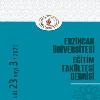Bağımsız Öğrenme Danışmanlığı Birimi Eğitim ve Uygulama Faaliyetleri
Öğrenen özerkliği, Bağımsız Öğrenme Merkezi, Öğrenme Danışmanlığı Programı, dil ediniminde danışmanlık
Independent Learning Advisory Education and Related Applications
Learner autonomy, Independent Learning Centre (ILC), Learning Advisory Program (LAP), advising in language learning,
___
- Aoki, N. (2003). Learner autonomy, teacher autonomy and the process of becoming a pro-autonomy teacher: Theoretical perspectives and life stories of six teachers of Japanese as a second language. Unpublished doctoral thesis, Trinity College Dublin.
- Aoki, N. (2012). Can-do statements for advisors. In C. Ludwig & J. Mynard (Eds) Autonomy in Language Learning: Advising in Action, 154-163. Canterbury: IATEFL.
- Autonomous Language Learning Modules, Helsinki University Language Centre, Finland http://www.helsinki.fi/kksc/alms/kaleidos.html
- Aydınlı, J., & Ortaçtepe, D. (2018). Selected research in applied linguistics and English language teaching in Turkey: 2010–2016. Language Teaching, 51(2), 210-245. doi:10.1017/S0261444818000010
- Benson, P. (2011). Teaching and researching autonomy. Harlow, UK: Pearson.
- British Council (2013). Turkey national needs assessment of state school English language teaching. Ankara: Mattek.
- British Council (2015). The state of English in higher education in Turkey. Ankara: Yorum.
- Bülbül, T. (2012). Dropout in higher education: Reasons and solutions. Education and Science, 37(166), 219-235.
- Education First (EF) EPI: www.ef.com.tr/epi/
- Hofstede, G. (2001). Culture’s Consequences: comparing values, behaviors, institutions, and organizations across nations (2nd ed.). Thousand Oaks, CA: SAGE Publications.
- Kato, S., & Mynard, J. (2015). Reflective dialogue: Advising in language learning. New York, NY: Routledge.
- McMurry, B. L., Tanner, M. W. & Anderson, N. J. (2010). Self-access centres: Maximizing learners’ access to center resources. Studies in Self-Access Learning Journal, 1(2), 100-114.
- Merriam, S. B. (1998). Qualitative research and case study applications in education. San Francisco: Jossey-Bass.
- Milli Eğitim Bakanlığı Özel Eğitim Hizmetleri Yönetmeliği http://mevzuat.meb.gov.tr/html/66.html
- Nasöz, M. (2015). Turkish EFL learners’ readiness for autonomy and attitudes toward self-access center. [Unpublished master’s dissertation]. İhsan Doğramacı Bilkent University, Ankara, Turkey.
- Seidman, I. (1999). Interviewing as qualitative research: A guide for researchers in education and the social sciences. New York: Teachers College Press.Türkiye Yükseköğretim Yeterlilikler Çerçevesi: http://tyyc.yok.gov.tr/?pid=33
- Uzun, T. (2014). Learning styles of independent learning centre users. Studies in Self-Access Learning Journal, 5(3), 246-264.
- Uzun, T, Karaaslan, H. & Şen, M. (March, 2016). On the road to developing a Learning Advisory Program (LAP). Studies in Self-Access Learning Journal, 7(1), 84-95.
- Uzun, T, Karaaslan, H. & Şen, M. (September, 2015). Going beyond the regular curriculum: Towards the development of a Learning Advisory Program (LAP). In Proceedings of the Self in Language Learning (SILL) International Conference, Çağ University, Mersin, Turkey.
- Whitworth, L., Kimsey-House, H., & Sandahl, P. (1998). Co-active coaching: New skills for coaching people toward success in work and life. Palo Alto: Davies Black Publishing.
- Yamamoto, K. (2018). The journey of ‘becoming’ a learning advisor: A reflection on my first-year experience. RELAYJournal 1(1). https://kuis.kandagaigo.ac.jp/relayjournal/issues/jan18/yamamoto/
- Yamashita, H. (2015). Affect and the development of learner autonomy through advising. Studies in Self-Access Learning Journal, 6(1), 62-85.
- Yamashita, H., & Mynard, J. (2015). Dialogue and advising in self-access learning: Introduction to the special issue. Studies in Self-Access Learning Journal, 6(1), 1-12.
- Yıldırım, A. ve Şimşek, H. (2003). Sosyal bilimlerde nitel araştırma yöntemleri. Ankara: Seçkin Yayınları
- Yayın Aralığı: Yılda 4 Sayı
- Başlangıç: 1999
- Yayıncı: Erzincan Binali Yıldırım Üniversitesi
Tarihi Dizilerle Yaşam Boyu Öğrenme Algısının Televizyon İzlenme Durumuna Göre İncelenmesi
Ortaokul Matematik Öğretmenlerinin Aritmetik ve Cebir Problemleri Hakkındaki İnanışları
Yaşar AKKAN, Mesut ÖZTÜRK, Pınar AKKAN, Betül KÜÇÜK DEMİR
Ortaokul Matematik Öğretmenlerinin Aritmetik ve Cebir Problemleri Hakkındaki Görüşleri ve İnançları
Mesut ÖZTÜRK, Betül Küçük DEMİR, Pınar AKKAN, Yaşar Akkan
Özlem BAYDAŞ, Serap UZUNER YURT, Elif AKTAŞ
Okul Öncesi Öğretmen Adaylarının FeTeMM Farkındalıklarının Değerlendirilmesi
Zeynep DERE, Zeynep KOYUNLU ÜNLÜ
Resim İş (Görsel Sanatlar) Öğretmenliği Öğrencilerinin Sanatsal Yaratım Süreçleri
Boşlukları Doldurunuz: Öğrenciler Okulda ……… Oynamak İstiyor
Temel Geometri Kavramlarına İlişkin Matematik Öğretmen Adaylarının Genel Alan Bilgisi
İlkokul Birinci Sınıf Öğrencilerinin Dik Temel Yazı ile Kelime Yazım Hatalarının İncelenmesi
